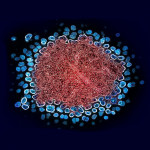A team of researchers has identified how the anti-herpes drug acyclovir (Zovirax) limits HIV replication in people coinfected with herpes simplex virus (HSV), according to a report published in the September 11 issue of Cell Host & Microbe.
During the past 15 years, scientists have occasionally reported that people with HIV taking acyclovir for herpes also appear to have survival advantages and reductions in HIV levels, compared with people coinfected with both viruses not taking acyclovir. Until now, however, researchers doubted that acyclovir directly affected HIV replication. Rather, because acyclovir can reduce inflammation of the immune system by lowering herpes virus levels, experts assumed it also reduces the number active CD4 cells that can become targets of HIV infection.
Andrea Lisco, MD, PhD, from the National Institutes of Health in Bethesda, Maryland, and her colleagues suspected that acyclovir may actually have direct anti-HIV activity, at least within cells that are also infected with herpes viruses. Their suspicions were due to the way that acyclovir works.
For acyclovir to be incorporated into newly forming herpes viruses—thus stopping viral replication—it must first bind to phosphorus molecules with the help of a herpes virus enzyme called thymidine kinase. Dr. Lisco and her team theorized that acyclovir may act against HIV only once it has been bound to phosphorus molecules, a process called phosphorylation, which can only occur in herpes infected cells carrying the thymidine kinase enzyme.
Lisco’s team first studied acyclovir’s impact on HIV in cells that were infected or uninfected with herpes. They confirmed that HIV reproduction did decrease only in cells infected with herpes. Taking their experiments one step further, they added a laboratory version of acyclovir that was already phosphorylated. The phosphorylated acyclovir acted against HIV even in cells that weren’t coinfected with herpes.
The authors suggest that treating people infected with both HIV and herpes with both HIV treatments and acyclovir could diminish the likelihood of transmitting HIV—a conclusion that has been offered by other research teams. They also comment that further research should be conducted with various formulations of acyclovir to determine whether it may have a role in combination anti-HIV therapy.
Advertisement
Advertisement
Advertisement






3 Comments
3 Comments